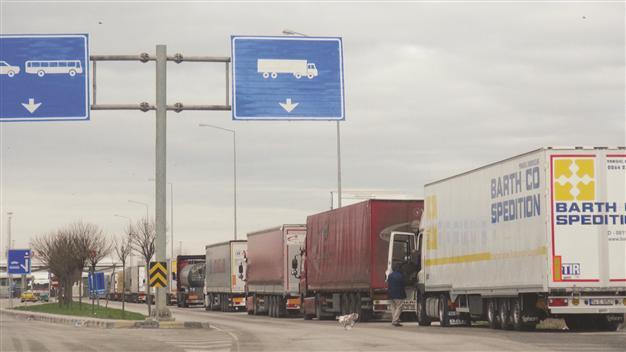Turkey, Bulgaria place ban each other’s trucks
ISTANBUL – Hürriyet Daily News

A ban on transporter trucks from traveling between Turkey and Bulgaria has caused hundreds of trucks to line up at Kapıkule-Kapitan Andreevo customs gate at the border over the past weekend. DHA Photo
A disagreement over transit passes between Turkey and Bulgaria has resulted in the closure of the frontier to their respective neighbor’s trucks, prompting Turkish transporters to steer their rigs for new routes.The tension between the neighbors was sparked when Bulgaria only gave 5,000 of the 125,000 transit pass permits it was expected to give Turkish trucks at the beginning of the year.
Turkey then closed its gates to Bulgarian trucks on Jan. 31 in a warning over the permit dispute. Sofia responded to Turkey’s move by also banning Turkish trucks from entering Bulgaria on Feb. 1.
The shutdown of the Kapıkule-Kapitan Andreevo customs gates between the countries has resulted in a long, snaking line of trucks waiting to cross the border.
Turkish Transport Minister Lütfi Elvan said yesterday that Turkey would open the gates after Bulgaria sends all the expected permits, adding that there was no “serious” blockade at Kapıkule.
Aiming to play down the impact of the deadlock with Bulgaria, the minister said there was no problem with exports thanks to alternative routes.
“We track everything minute by minute. We hope this will be solved in a short period of time,” he said.
Meanwhile, Bulgarian Association of Road Transport Unions (BASAT) Chairman İliyan Filipov said the goods in the trucks would be transferred in order to avoid any damage to customers, Anadolu Agency reported.
He stated the goods in Turkish trucks would be transferred to Bulgarian trucks and vice versa.
But to avoid major damage from the dispute, Turkish exporters immediately turned to alternative routes to transport Turkish goods to Europe, International Transporters Association (UND) Chairman Çetin Nuhoğlu told the Hürriyet Daily News yesterday in a phone interview.
Some of the goods have been transported through the İpsala customs gate between Turkey and Greece, with 250 trucks crossing there yesterday alone, he said.
However, the high volume at İpsala caused 16-kilometer-long queues to form at the gate, forcing transporters to consider tertiary options.
Transporters have subsequently begun additional Ro-Ro journeys from Istanbul to the Italian port of Trieste, Nuhoğlu said.
He added that they were in talks with Romanian and Greek authorities to create two new routes, including Ro-Ro journeys between Istanbul and the Romanian port of Costanza and a road link between Istanbul and Thessaloniki before goods would be loaded onto Ro-Ro ships to be transported to Trieste.
During yesterday’s interview Nuhoğlu said: “What Bulgaria has been doing is completely unlawful and is against all international agreements.”
Bulgaria’s decision to block Turkish transporters from undertaking transit transport across its territory also violates an accord signed by the transport ministers of the two countries in 2012, Nuhoğlu said.
The representative of the transporters in Turkey claimed the Bulgarian government had acted upon pressure from two large Bulgarian companies.
“This should not be only attributed to Bulgarian government or all Bulgarian transporters, as this was the attitude of two Bulgarian companies which have become really powerful over the past five or six years,” Nuhoğlu said, adding that smaller Bulgarian companies would be harmed by the exclusion of Turkish trucks as well.
















